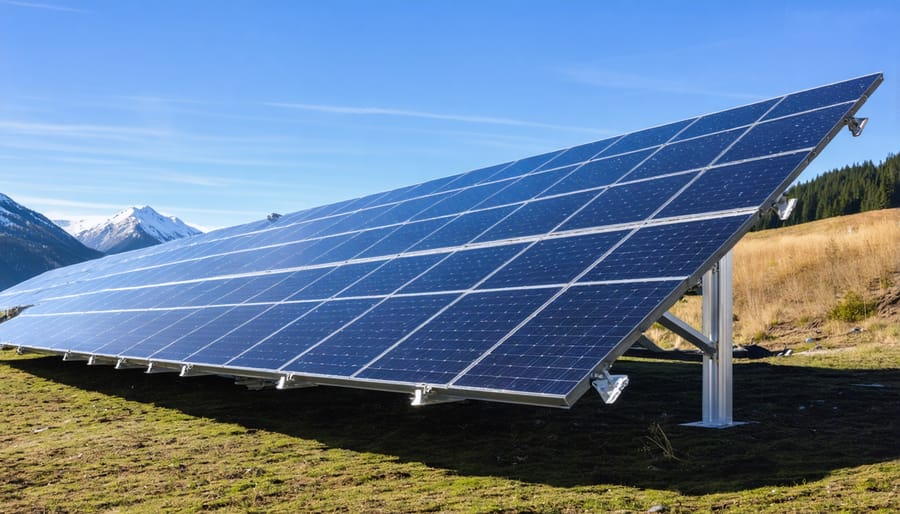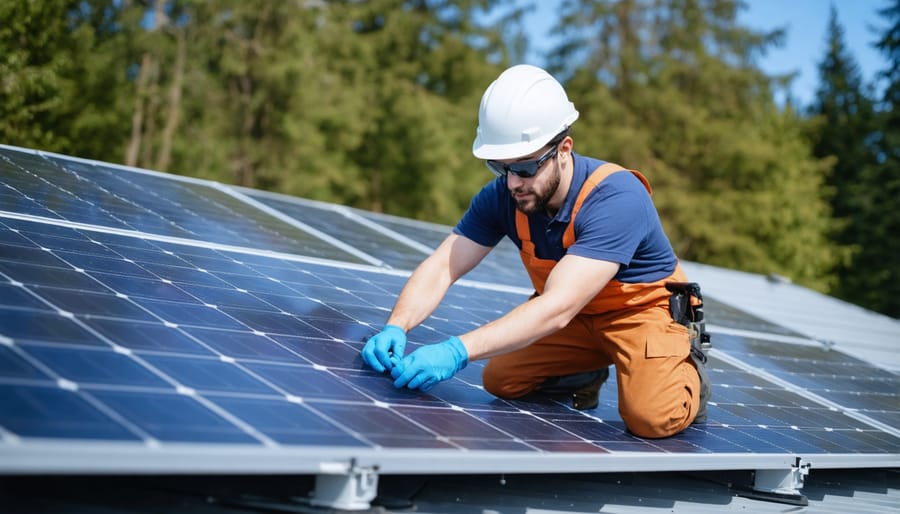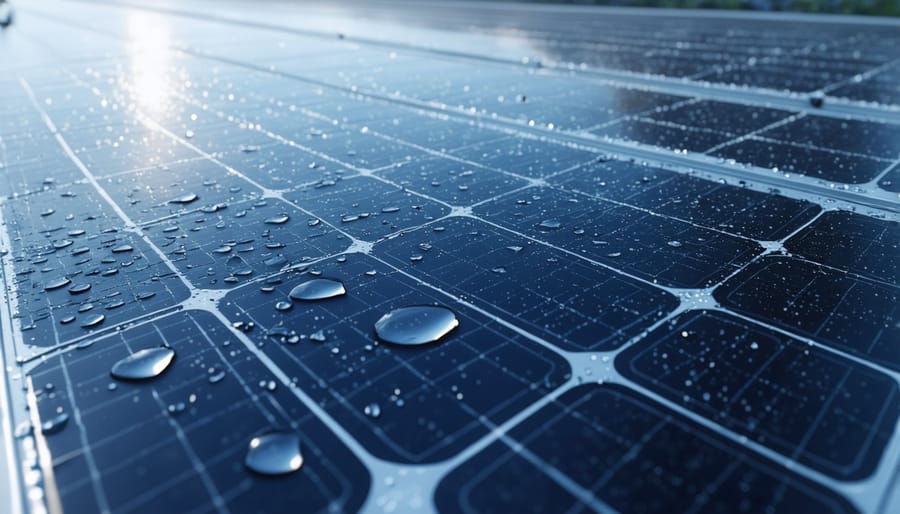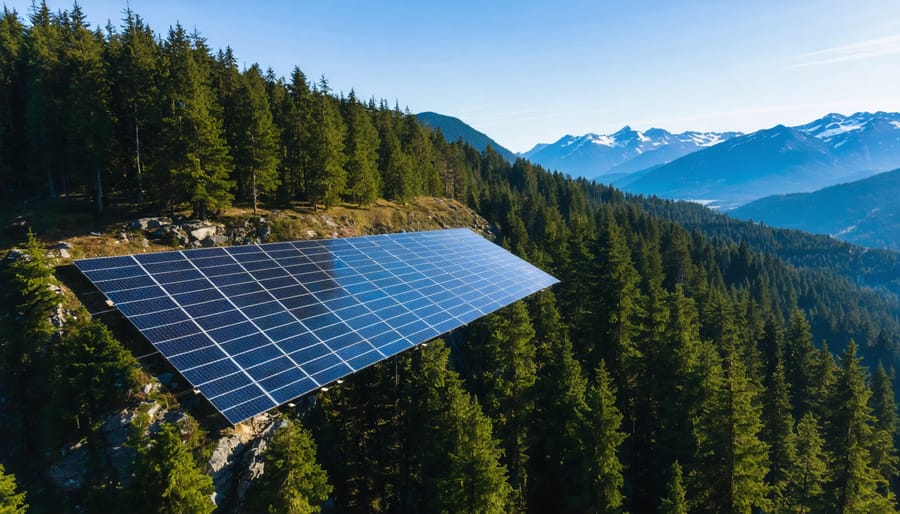Renewable energy stands at the forefront of our fight against climate change, yet questions about its long-term viability persist. The sustainability of solar panels and other renewable technologies extends far beyond their immediate environmental benefits. As global energy demands surge, renewable sources demonstrate remarkable resilience, offering a triple advantage of environmental stewardship, economic stability, and social progress.
Unlike finite fossil fuels, renewable energy harnesses naturally replenishing resources, fundamentally transforming our approach to power generation. This transformation isn’t just about replacing one energy source with another – it’s about creating a self-sustaining ecosystem where energy production meets present needs without compromising future generations’ ability to meet theirs.
British Columbia stands uniquely positioned to leverage these sustainable energy solutions, with abundant hydroelectric, wind, and solar resources at our disposal. The province’s commitment to clean energy innovation, coupled with advancing technology and declining costs, creates an unprecedented opportunity for businesses and households to participate in the renewable energy revolution.
This shift towards renewable energy isn’t just environmentally conscious – it’s economically imperative. As traditional energy costs rise and climate regulations tighten, sustainable energy solutions offer a path to energy independence, price stability, and long-term economic resilience.

The Environmental Impact of Solar Energy Systems
Carbon Footprint During Manufacturing
While solar panels generate clean energy during operation, it’s important to understand their manufacturing footprint. The production process requires energy for mining raw materials, processing silicon, and assembling panels. On average, a typical solar panel takes 1-2 years of clean energy generation to offset the emissions from its manufacturing.
BC’s clean hydroelectric grid gives local solar manufacturing a significant advantage. Panels produced using our province’s low-carbon electricity have a smaller carbon footprint compared to those manufactured in regions relying on coal power. Several BC-based manufacturers are leading the way in sustainable production practices, using recycled materials and energy-efficient processes.
Recent innovations are continuously reducing manufacturing emissions. New technologies allow for thinner silicon wafers, requiring less raw material and energy to produce. Some manufacturers now use renewable energy to power their facilities, creating a truly sustainable cycle of clean energy production.
The industry is also addressing end-of-life concerns through improved recycling programs. Modern solar panels are designed for easier dismantling and material recovery, ensuring that components can be reused in future manufacturing. This circular approach further reduces the overall environmental impact of solar technology.
When considering solar installation, choosing panels from manufacturers with strong environmental commitments can help minimize your project’s carbon footprint while supporting sustainable industry practices.
Lifetime Environmental Benefits
Renewable energy systems deliver substantial environmental benefits throughout their operational lifetime, creating a positive impact that extends far beyond their initial installation. In British Columbia, where hydroelectric power already provides clean energy, adding other renewable sources like solar and wind further reduces our carbon footprint and helps protect our province’s natural beauty.
A typical solar installation in BC can prevent approximately 1-2 tonnes of carbon emissions annually, equivalent to planting 40-80 trees each year. Over a 25-year lifespan, that’s the same as taking 12-25 cars off our roads. Wind turbines show even more impressive results, with a single industrial turbine preventing up to 4,000 tonnes of CO2 emissions during its lifetime.
Beyond carbon reduction, renewable energy systems help preserve our water resources. Unlike traditional power plants that require massive amounts of water for cooling, solar panels and wind turbines need virtually no water to operate. In BC, this means less strain on our precious freshwater systems and better protection for our salmon-bearing rivers.
The environmental advantages extend to air quality as well. By replacing fossil fuel generation, renewable energy systems help reduce particulate matter and other harmful pollutants that contribute to respiratory issues. Communities near renewable installations often report improved air quality and associated health benefits, creating a cleaner, healthier environment for future generations.
Material Sustainability and Recycling
Raw Material Availability
As solar energy continues to grow in British Columbia, understanding the availability of raw materials used in solar panels becomes increasingly important. The primary materials include silicon, silver, aluminum, and glass, with silicon being the most crucial component. Fortunately, silicon is abundant, making up about 27% of the Earth’s crust, and is primarily sourced from quartz, which is readily available.
However, some components require careful consideration. Silver, used in the conductive elements of solar panels, is a finite resource. Industry innovators are addressing this by developing alternatives and reducing the amount of silver needed per panel. Many manufacturers are also exploring copper-based alternatives, which are more abundant and cost-effective.
British Columbia’s mining sector plays a significant role in supplying some of these materials. Local quarries provide high-grade quartz, while aluminum production benefits from the province’s clean hydroelectric power. This local connection helps reduce transportation emissions and supports our regional economy.
Recycling initiatives are becoming increasingly important for sustainable material management. As first-generation solar panels reach the end of their life cycle, specialized recycling facilities can recover up to 95% of materials for reuse. Several BC-based companies are already developing innovative recycling processes, ensuring these valuable materials stay in circulation.
Looking ahead, ongoing research into alternative materials and more efficient manufacturing processes continues to improve the sustainability of solar panel production, making solar energy an increasingly viable long-term solution for our region.
BC’s Solar Recycling Solutions
British Columbia is taking significant steps to address the end-of-life management of solar panels through innovative solar panel recycling programs. The province has partnered with local waste management facilities and solar companies to create a comprehensive recycling network that ensures sustainable disposal of photovoltaic materials.
Leading this initiative is the BC Solar Waste Coalition, which coordinates collection points throughout the province where residents and businesses can drop off their decommissioned solar panels. These materials are then processed at specialized facilities in Vancouver and Victoria, where up to 95% of panel components are recovered and repurposed.
Local success stories include the Surrey Solar Recovery Center, which processed over 5,000 panels in 2022, successfully recovering valuable materials like silicon, silver, and aluminum. The facility employs innovative separation techniques that minimize environmental impact while maximizing resource recovery.
Communities across BC are also implementing educational programs to help solar panel owners understand proper disposal methods. The “Solar Smart BC” initiative provides resources and guidelines for maintaining panels to extend their lifespan and ensuring responsible end-of-life disposal.
For businesses and homeowners planning new solar installations, many suppliers now offer take-back programs, ensuring a closed-loop system for panel disposal. These programs typically include free collection services and detailed documentation of the recycling process, making sustainable disposal accessible and transparent.
Economic Sustainability in British Columbia
Installation and Maintenance Costs
The initial investment in solar installations varies significantly based on system size and property specifications. For a typical British Columbia home, residential solar systems range from $15,000 to $25,000 before incentives and rebates. Business installations generally start at $30,000 and can reach several hundred thousand dollars depending on energy requirements.
However, these upfront costs are offset by BC’s generous renewable energy incentives and long-term energy savings. Local homeowners can expect to recover their initial investment within 8-12 years through reduced electricity bills and available tax credits. The Smiths, a Vancouver family who installed solar panels in 2020, report saving approximately $1,200 annually on energy costs.
Maintenance costs are surprisingly modest, typically ranging from $200-$400 per year for residential systems. This includes annual inspections, cleaning, and minor repairs. Solar panels are remarkably durable, with most manufacturers offering 25-year warranties and panels often lasting 30+ years with proper care.
Key maintenance tasks include:
– Bi-annual cleaning to remove debris and maximize efficiency
– Annual professional inspection
– Occasional inverter checks and replacement (usually once every 10-15 years)
– Snow removal in winter months (particularly relevant for interior BC)
Many local solar providers now offer maintenance packages bundled with installation, making it easier for property owners to budget for ongoing care while ensuring optimal system performance throughout its lifespan.
Long-term Return on Investment
In British Columbia’s unique climate, renewable energy investments consistently demonstrate strong long-term financial returns. The typical solar panel payback period ranges from 8 to 12 years, depending on factors like installation location, system size, and local electricity rates. For example, homeowners in sunny regions like the Okanagan Valley often see faster returns due to higher solar exposure.
BC Hydro’s tiered rate structure makes renewable energy particularly attractive, as households can significantly reduce their exposure to higher-tier electricity rates. A typical 6kW residential solar installation in Vancouver can save homeowners between $1,000 and $1,500 annually on electricity bills, with savings increasing as utility rates rise over time.
Beyond direct energy savings, renewable installations add substantial value to properties. Local real estate data shows that homes with solar installations command a premium of 3-4% in the BC market. Additionally, provincial and federal incentives, including tax credits and rebate programs, can reduce initial investment costs by 20-30%.
Commercial properties often see even more impressive returns, with larger systems benefiting from economies of scale. Many BC businesses report complete investment recovery within 6-8 years, followed by decades of reduced operating costs. When factoring in equipment longevity – most solar panels come with 25-year warranties – the long-term financial benefits become even more compelling.
Local Job Creation and Economic Growth
The transition to renewable energy is creating a significant economic ripple effect across British Columbia, generating thousands of new jobs and stimulating local economies. Recent studies show that for every megawatt of renewable energy installed, approximately 8-10 direct jobs are created in installation, maintenance, and operations.
In BC’s growing renewable energy sector, communities are experiencing increased employment opportunities in various fields, from technical positions like solar installers and wind turbine technicians to administrative and sales roles. Local businesses are also benefiting from the renewable energy supply chain, with manufacturers producing components and service providers offering specialized maintenance and consulting services.
Several BC communities have already witnessed this economic transformation. For instance, the City of Kimberley’s SunMine project not only generates clean energy but has also created sustainable employment opportunities and attracted new businesses to the region. Similarly, Vancouver Island’s growing wind energy sector has established training programs at local colleges, preparing residents for careers in renewable energy.
The economic benefits extend beyond direct employment. Renewable energy projects often result in increased property tax revenue for municipalities, supporting essential community services. Additionally, energy cost savings for businesses and homeowners lead to more disposable income being spent locally, further strengthening the regional economy. Indigenous communities are particularly benefiting from renewable energy partnerships, creating sustainable revenue streams and employment opportunities while maintaining environmental stewardship.


Future-Proofing Solar Investments
The renewable energy landscape is rapidly evolving, and British Columbia’s solar sector is no exception. Recent solar panel efficiency improvements have made investments in solar technology increasingly attractive for both homeowners and businesses. These advancements, coupled with supportive provincial policies, are creating a robust foundation for long-term solar sustainability.
BC’s Clean Energy Act and CleanBC initiative provide a strong policy framework that encourages solar adoption through incentives and rebates. These programs, combined with falling installation costs, have made solar investments more accessible than ever. Local municipalities are also playing their part by streamlining permit processes and offering additional incentives for solar installations.
Looking ahead, emerging technologies like smart inverters and advanced energy storage solutions are enhancing the reliability of solar systems. The integration of artificial intelligence for optimal energy management and predictive maintenance is helping system owners maximize their returns while extending equipment lifespan.
For BC residents considering solar investments, several key strategies can help ensure long-term viability:
– Choose high-quality equipment from reputable manufacturers with strong warranty coverage
– Work with certified installers who understand local climate conditions
– Plan for future expansion by ensuring your system is scalable
– Consider incorporating battery storage to maximize self-consumption
– Stay informed about maintenance requirements and technological updates
The BC solar market is also seeing innovation in financing options, including power purchase agreements and solar leasing programs, making it easier for more residents to participate in the renewable energy transition. With continuing technological advancement and strong policy support, solar investments in BC are well-positioned to deliver sustainable returns for decades to come.
The journey toward sustainable energy in British Columbia is well underway, with solar power playing an increasingly vital role in our renewable future. As we’ve explored throughout this article, solar energy offers a compelling combination of environmental benefits, economic advantages, and long-term sustainability that makes it an excellent choice for BC residents and businesses.
The evidence clearly shows that solar technology continues to improve in efficiency while decreasing in cost, making it more accessible than ever before. By embracing solar power, BC communities are not only reducing their carbon footprint but also creating local jobs and strengthening energy independence. The success stories of solar installations across the province, from residential rooftops to commercial installations, demonstrate the practical viability of this technology in our unique climate.
Looking ahead, the future of solar energy in BC appears bright, supported by favorable policies, improving technology, and growing public awareness. Whether you’re a homeowner considering rooftop panels or a business exploring renewable options, now is an excellent time to join BC’s solar revolution. By making the switch to solar, you’re not just investing in your own energy future – you’re contributing to a more sustainable British Columbia for generations to come.

